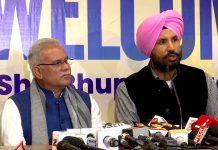New Delhi, July 13: A day before the crucial second round of technical-level talks for the Kartarpur corridor between India and Pakistan, in a late night development on Friday, Islamabad removed Khalistani supporter Gopal Singh Chawla from Pakistan Sikh Gurudwara Prabandhak Committee (PSGPC).
India had been raising concerns and objections regarding the inclusion of anti-India elements in a committee that is critical to the operationalisation of the Kartarpur Sahib corridor.
The other anti-India, pro-Khalistani agents that no longer figure on that list are Maninder Singh, Tara Singh, Bisan Singh, and Kuljit Singh.
Gopal Singh Chawla, who is known to be a close aide of Jamaat ud Dawa (JuD) chief Hafiz Saeed, has been using the Gurudwaras in Pakistan to propagate anti-India sentiments.
The decision comes just ahead of talks to be held on Sunday, July 14. Sources had told media on Friday evening that this matter would have come up during the talks.
Regarding our concerns over Khalistani elements, we have been raising it on a regular basis and have marked strong protests. We also asked for clarification as to why they have been included in the Kartarpur committee. During the upcoming meeting also this would be raised. We will ask them what they have done to address the issue, said a source.
But Pakistan has removed one major hurdle ahead of the talks. The second round of talks which were scheduled to take place on April 2 of this year were postponed after Khalistani elements were inducted in Pakistan’s Kartarpur corridor committee by Prime Minister Imran Khan.
In an official statement on Friday (March 29), India said, “The country has shared concerns and sought clarifications on reports that controversial elements have been appointed by Pakistan to a committee associated with the Kartarpur corridor. It has been conveyed that the next meeting on the modalities can be scheduled at an appropriate time after receiving Pakistan’s response.”
“India wants to go ahead with the corridor but without any let up on our security concerns”, a source said.
While one major impediment has been removed, it is a long way from finding common ground on technical issues to make the corridor operational for Sikh pilgrims to be able to celebrate Guru Nanak’s 550th birth anniversary in November this year.
Both sides are yet to agree on certain major issue such including the mode of connectivity. While India wants to build a bridge over a flood-prone creek that leads to Kartarpur Sahib, Pakistan is indistinguishable on a causeway.
The other issue is that of the numbers of pilgrims being allowed on a daily basis. While India is insisting on 5,000 pilgrims per day and is building infrastructure on its side accordingly, Pakistan is ready to handle just 700 pilgrims on a daily basis.
Pakistan’s willingness to allow just 700 pilgrims per day is way lower than the demand from Indian pilgrims. The number has to go up. Moreover, it wants pilgrims to move in groups while we demand flexibility, an official said.
Kartarpur Corridor was first proposed in 1999 by then Indian Prime Minister Atal Bihari Vajpayee. On 26 November 2018, the foundation stone for the Kartarpur corridor was laid down on the Pakistan side. Two days later the foundation stone for the corridor was laid down on the India side.
Both sides aim to finish work in time for the inauguration of the corridor to mark the 550th birth anniversary of Guru Nanak Dev on November 2019. Agencies















































